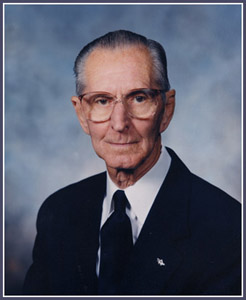
Oral Historian: Raymon ThackerInterview Date: 19 June 2006Interviewer: Angela NemecekTell me about your trip to New York City in August 1945.On 13 August 1945, Frank and Phyllis Blighly, Bill and Carol Homburg of Richmond, and I got in a new Mercury car and drove to Hershey, Pennsylvania. We went up there to attend the conference of the National Funeral Directors Association. We had heard rumors of the possibility of an armistice being signed somewhere along the way, but we really didn't pay much attention to it. We attended the conference in Hershey - it's not very far to New York City, and we had reservations at the Hotel Astor which is right on Time's Square. After the conference, we drove on into New York on the 14th and arrived there about 3 o'clock in the afternoon. The police stopped us about 5 blocks from the Hotel Astor and said us that because of the huge amount of crowds accumulating in Time's Square that we couldn't go any further with the automobile. We would have to walk from where we were to the hotel and send bell boys back to get the luggage. So we parked where the police told us to park, left the car, and walked to the hotel. The boys went back and picked up our luggage for us. Then we freshened up a little bit from the trip from Hershey. Phyllis said she'd wanted to go to the Luca Italian Gardens, which was about 2 ˝ blocks from the hotel. We all agreed and went around to the Gardens and had a delicious dinner. While we were drinking on an after-dinner drink, Mr. Truman came on the radio and announced the end of the war. The Armistice had been signed between the Emperor of Japan and General Douglas MacArthur on his battleship in the Bay of Tokyo. Everybody went smack-dab crazy! There were over a million people congregated in Time's Square. When we came out of the Luca Italian Gardens to start back to the hotel, Frank said, "The President said there would be a 3-day moratorium. Everything will be closed for 3-days, and we won't have enough whiskey to carry us over!" So we looked around and found a little whiskey store about half a block from where we were. We went in, and I bought two bottles of Four Roses, Frank and Bill each bought of 3 bottles.
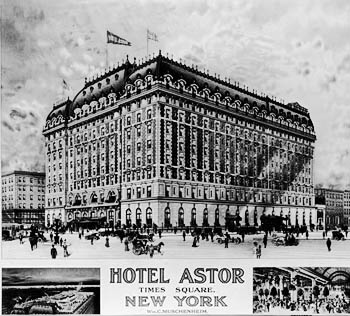
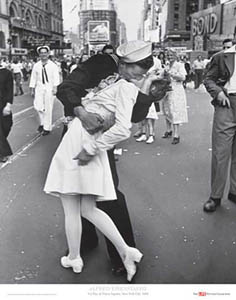 Alfred Eisenstaedt took the famed kissing photo for LIFE on V-J Day, 1945. Hotel Astor, where Raymon stayed that night, is shown at the top right of Eisenstaedt's photo. We got a little bit out of that hustle and bustle there to get around to the backside of the crowds and made our way back to our hotel. The next day we realized that we didn't have our automobile. We realized also that we probably didn't have any place to get gas either. So Frank called a funeral director friend of his and he sent us a beautiful limousine and a chauffeur to take us to Belmont race track. We spent the whole day out there and had just a wonderful time. As I was talking about the whiskey, each bottle of Four Roses had a St. Christopher's medal attached to it. That is the patron saint of travelers and here is mine from my first bottle of Four Roses (he carries it in his pocket every day); my second bottle has never been opened. It's got the seal of New York on it, just like it was in 1945. I've saved it because of where it came from. Here is the hotel bill. This sounds ridiculous, but the cost of my staying over each day was just $4 a day. This was a huge, HUGE hotel right on Time's Square. I had a suit pressed while I was there, and the total cost of my staying there for the 14th - 17th was $19.61. And that hotel was smack dab in Time's Square, and over a million people were crowded in the square that night. It was something --- something to see. There was a 3-day moratorium. All the stores, all the government places were closed. Liquor stores were closed. Gas stations were closed. And so we were kind of stuck there until we found this funeral director who was kind enough to send us a limousine. We went to Belmont Race Track and played the races all day long! So at least the race track was open-we had a wonderful time! How long did it take you to get back home?After we left on the 17th, we drove back to Richmond in about 7 hours with no problems at all. I understand that you had a role getting the Tire Plant in Scottsville during the war?Yes, and during the war I served with the Treasury Department in the Defense Savings Staff. Whenever they needed me to go somewhere and speak - we were pushing the sale of war bonds to get the money to feed the war. It wasn't an easy job. I'd pop up at the Uniroyal plant or go first one place or another where there was a congregation of people to talk to them about buying war bonds, savings certificates, and things of that kind. I wasn't in the service, although I tried to get in. The group I wanted to go with was the medical staff at the University of Virginia. I wanted to go with them, but their limit had been reached of people to go. So I didn't have a chance to go. Then I went to Richmond, stood around in my 'birthday suit', and checked my heart and all kinds of stuff like that. Finally the man told me, "Mr. Thacker, you're underweight-you lack about 5 lbs. The Army just won't take you. You might have a chance with the Navy. " I said, "Nope, I don't want the Navy." And he said, "Well, if you'd just eaten another banana this morning, you might have gotten in!" How much did you weigh?I don't remember exactly - about 110 lbs. I weigh 120 now - that's the most I've ever weighed in my life. How tall were you?5'7" . After I came back home, I got a big thing from the Board of Albemarle County, and they said that they understood that I was the only embalmer in the county of Albemarle. They said that I would be of more service to the war effort being at home than in the service. They gave me a deferment. So I stayed at home and didn't go. Then the Defense Savings Staff came to Scottsville and found me. They asked me if I'd do it, and I said, "Yes, I will -- anything I can do to help." How many people from around here were part of it?I was the only one. I was on the Town Council at that time - I was very active! Secretary-treasurer of the Lions' Club, and a lot of our activities tried to get organizations to support the services. Like the Uniroyal plant - two men came into Scottsville one day and went into the drugstore. They asked Mr. Bruce at the drugstore if he knew a location in Scottsville suitable for the rubber plant. Mr. Bruce said, "I think I'd better call somebody to talk about this." So he called me on the phone and asked me to come up there. And I met with them and discussed what they needed and what they wanted. They said that they'd been to Louisa and looked at a plant that had already been built. But there were some things about it that they didn't like. One thing - it wasn't near a railroad, and another thing - the plant just didn't suit them for what they were looking for. So I said that I knew of several places. One place was very nice and close to the railroad and close to the river. This gentleman asked me: "Do you think you can get the railroad people to build a spur into the plant if we build it?" And I said, "We sure can because the superintendent of the railroad is a friend of mine." And I talked to him, and we went down to the depot. I got on the phone there and talked to Mr. Glenn, who was the superintendent of the railroad, and I told him there was a possibility of maybe getting a plant here if we could get a spur from the main line over to the plant. And I said, "Would you build that for us?" And he said, "I surely will. All you have to tell us is where you want it, and if it's convenient there, we'll certainly put it there." So that satisfied them about the railroad. The next thing, of course, was the river, and the river was close to this location that I had in mind. And there were several drainage ditches going into the river that could be used for piping and all without too much expense. So I took them around and showed them the property, and they liked it very much. The next question was to get the title of the land. It belonged to Dr. Stinson and his wife, Miss Nannie. I went up there with those two gentlemen, but Dr. Stinson said, "We're not interested. We don't want a dirty plant in Scottsville. They were ugly. One man reached in his pocket, and Dr. Stinson said, "If you're getting a cigarette, don't get it -- you can't smoke it in here." There were just nasty to them. We got out of there and went back to the drugstore to talk about it. Guy Moon and C.R. Dorrier came down there and talked to us. This man said, "We're going back to Charlottesville to spend the night and will stay at the Monticello Hotel. If you can persuade these people to give us the title to the property, we'll pay them the price that the property's worth. But you have to get the title. If you can swing it, that's fine. If you can't, we'll go back to Washington - we like this location and we'll just come in here and take it. The Federal Government has that right, you know: eminent domain. They can step in and take it if they need it for defense. So I went back up to Dr. Stinson's house and sat down to talk with him. Dr. Stinson was fairly well known all over the country because he was an abortionist and was exceptionally good at it. He was doing a terrific practice, and I'm sure he was making a lot of money. So I told him and Miss Nannie, "Now look - those men are form the Treasury Department Defense Plant Corporation in Washington. All they would have to do is step across the street to the Justice Department and ask them to come down and take a look at Dr. Stinson and what he's doing in Scottsville to see why he's making so much money. And I said, "Doctor, they could ruin you. They really could put you in a penitentiary and maybe for the rest of your life, and I don't want that. But I think it is very foolish of you not to go ahead and agree on it. It certainly won't hurt your property up there." (He had 500 acres in that tract of land and only had to give up 14 acres to start with. That wouldn't hurt his property). Well, he hemmed and hawed, and finally said 'ok'. So I went back there and called those two men. And we got everything straightened out. And the first thing you know, here came a whole bunch of vehicles full of construction people, Defense Corporation sent Mr. Scherer down - he was a Jewish fellow and I got to know him very well. We were very cooperative. He did things that we wanted him to do, and we did everything we could to help him get the plant going. It got going and we had a dedication of it - I believe that was in 1945. I guess the war was coming to an end by then, but who knew what might happen in the country. The government was desperately in need of rubber automobile tires and truck tires and things of that kind. And, of course tires for the big trucks in service of the Army. So we were rationed everything that the plant would get like automobile tires and things like gasoline. Everything was being rationed. So the plant ended up being a great asset to Scottsville. Dr. Stinson and Dr. Harris both opposed it bitterly -- and reaped more benefit from it than anybody I know of. Dr. Harris became the company doctor and stayed the company doctor until he died. Dr. Stinson built a whole bunch of houses for people to live in who worked in the plant. So he made a lot of money on it. So actually the plant benefited everybody in the whole community. Economically, it brought in a payroll of 325 people employed. I suspect the payroll brought in several million dollars a year or more, which was practically all dumped in Scottsville at that time. Now the employees are more or less people from outlying districts who trade in the districts from which they come. It's been an economic asset for the town of Scottsville - I don't know what the town would have done without it. And I was really happy that I had a part in it…really happy that I could find the right people to take care of it. 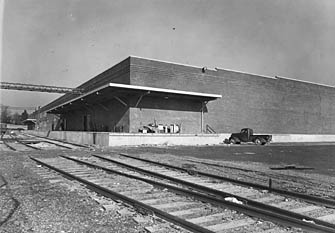 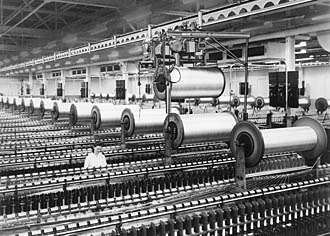 The Uniroyal Plant in Scottsville, VA. (Photos courtesy of Hyosung, Inc., Scottsville)
I was able then to get my friend, Colgate Darden, the Governor of Virginia, to come up here for the dedication of the plant. And one of the Generals of the Army came up here for it - I can't remember his name. The important part was that we were able to locate the plant in Scottsville, and the economic value of it to this community was tremendous! Tell me a little more about rationing during WWII.My brother and I ran the funeral home in Scottsville for 67 years before we sold it. Back in those days of rationing, we had the problem of getting gasoline enough because we had ambulance service as well as funeral work. They cut my ration of gasoline right down, and so I couldn't get any sense out of the ration board in Charlottesville. So I got in the car and went to Richmond to see Mr. Bullington, who was the Virginia State Director. I told him: " We are doing ambulance work, taking people to the hospital, who were sick as well as doing funeral work. But we aren't getting enough gasoline, and people are calling for our ambulance service. We're not sure how ill they are when they call, and so we have to go. I tell you what I'm going to do: if you don't want to increase our allotment, I'm going to bring one of the dead bodies down here and put it in your office. I'll leave it here until you give us more gasoline." Mr. Bullington laughed and said, "Hmmmmm….I'll get the boys in Charlottesville to get in touch with you." And we got an increase in gasoline - it worked! 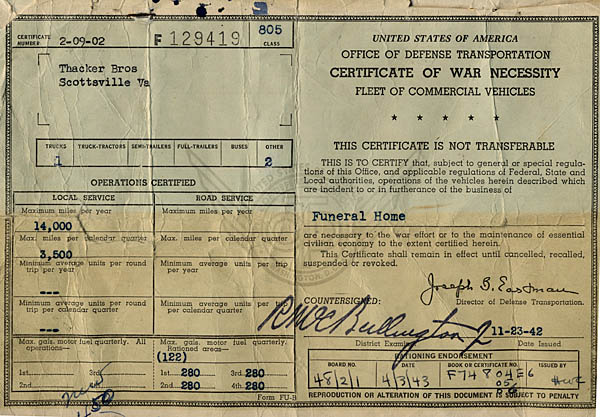 District Examiner, increased the gasoline allotment for Thacker Bros. from 280 to 450 gallons per quarter so that they could also provide ambulance service. Ok, here is a 'Certificate of War Necessity' for a fleet of commercial vehicles. And these (ration stamps) are for gasoline, oil, and tires - they had to be presented at the time of purchase. Service stations had to make written copies - they didn't have machines like we have now. So they'd make a written copy so they'd know how much you were allowed per time period. And we kept records of it, too. Back in WWII, I did as much as possible as I could possibly do with the Defense Plant thing. Working with the Lions Club, we held a bunch of shows at the Theater. Every time we had a show, we tried to sell war bonds. I have records of what we did, which was exceptionally good for a small town. I also have a picture of a bunch of girls here in Scottsville, gathering up tin - every piece of metal and tin that they could find. They did a marvelous job - great big stacks of stuff that they gathered: iron and everything. That was for the Army and Navy - they would melt it down and make new ammunition and new guns, tanks, and everything else. Then we had a 'home guard.' At that period of time, we had about 35 people who were classified as home guard. We would have classes and teach them what was expected of them. During certain periods, we would have black outs here in town. These people we called 'home guard' would go from one place to another to check if lights could be seen anywhere. They'd check on people's houses, and if they saw lights somewhere, we'd tell them so that they could keep that place up next time and not get caught. When I organized the Lion's Club, we had people under our home guard situation, who were listening for planes. We had three or four locations: one location which was exceptionally nice was up at Estouteville on Green Mountain. I'll never forget trying to persuade a Baptist preacher, Oscar Northern to become a member of the Lions Club and also to become its first president. I went up there with this man from Chicago, and we talked the whole afternoon with that man until we finally persuaded him to agree. And he went up to Estouteville, listening for planes. Frankly, it may have been a necessary thing, but no planes ever got to American shores. So I guess a lot of that time (plane-spotting) was lost. But if you caught just one plane, it might have helped create a situation that was beneficial to have those people listening for planes. We gathered up a whole bunch of metal and stuff. And people worked hard - long hours. The Uniroyal plant, once it got in operation, it just went to town. They worked 3 shifts, 24-hours per day. In fact, they still do today. But those people worked long hours but didn't seem bothered by it.
The first thing I did was ask the fire department for permission to clean the floor really good, because it was a beautiful floor. Great big old boards in the floor - heart pine. So we sanded them down a little bit to get them smooth. And we put corn meal on top of the floor and had dances. We held dances every Friday night, and people just came to it. It was recreation for them, something they really needed. And that was sort of a historic thing for the Town of Scottsville. Good dances every Friday, and the Scottsville fire department ran the dances. That helped the whole community - it really did! Some crack pots came to it, but at the same time, nicer people came, too. And they mixed up all right. Of course, there was some drinking - I think there was plenty of Four Roses over there. And they had a fine time! We had a local orchestra that was exceptionally good - we had a wonderful time. And it broke the monotony of the war. Life in Scottsville during WWII was an active and continuing struggle to make ends meet and do the jobs we were supposed to do. A lot of our people went away from here to shipyards. A number went to the shipyards in Norfolk, and a whole lot when to the shipyards in Baltimore, MD. I have a number of medal plaques that came back on the boxes that were shipped to me with boys' bodies in them. I think one for the Anderson boy, the Tapscott boy, the McGuire boy, and the Lewis boy - but that was always sad. Really sad. So you did the funeral preparations for those boys?Yes, we had military funerals for them, and every one of them was escorted by military personnel. They would stay over until after the service, and Ft. Lee normally furnished military personnel for the services. The Government was really good about that. If a boy was killed in the service, the Government would go all out to see that he got a proper burial. It was sad - really sad. I'll tell you a funny story. Mr. Hamner ran the funeral home at Blackstone, and he said that he had a boy shipped back from Europe where he was killed in service. And they held a military service for him, and the little cemetery was up on a hill side. A fence was around the little cemetery, and you had to go inside the fence to get to the grave where they buried the boy. So they put the body in there on a lowering device over the grave, and the family came inside the fence. The grandmother was standing there, holding her little grandson's hand while the service was going on. The firing squad was up on the hill, just a little way from the cemetery. When the firing squad fired the first shot, the grandmother fainted and fell to the ground. And the little boy said, "Oh my GOD, now they've shot Grandma!" |